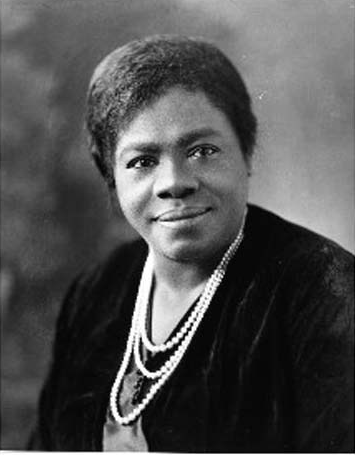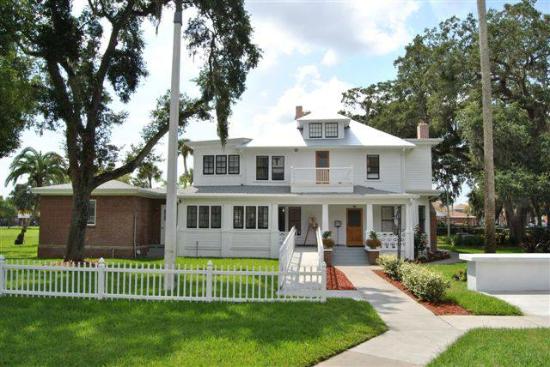
The year was 1904, when a very determined young black woman, Mary McLeod Bethune, opened the Daytona Educational and Industrial Training School for Negro Girls in Daytona Beach, Florida. It has undergone many stages of growth and development through the years. In 1923, it became a co-ed high school as a result of a merger with Cookman Institute of Jacksonville, Florida. A year later, the school became affiliated with the United Methodist Church. Evolving into a junior college by 1931, it was renamed Bethune-Cookman College.
In 1941, the Florida State Department of Education approved a four-year baccalaureate program offering liberal arts and professor education. Mrs. Bethune retired in 1942 at which time James E. Colston became president until 1946 when Mrs. Bethune resumed the presidency for a year.
Richard V. Moore, Sr., Ph.D., became president in 1947. Under his tenure the College was accredited by the Southern Association of Colleges and Schools in 1960 and joined the United Negro College Fund in addition to other academic and professional organizations. By 1974, the curriculum expanded to 12 degree-granting fields, student enrollment increased and new buildings were constructed for residential housing and classrooms.
Appointed to the presidency in 1975 by the Board of Trustees, an alumnus, Oswald P. Bronson, Sr., Ph.D., continued the development and expansion of the College. During his tenure, a steadily increasing student body resulted in the renovation and expansion of the physical plant including new residence halls, new classroom buildings, performing arts center and acquisition of land for future construction. Presently, there are 37 academic degree-granting fields. In addition, professional studies sites throughout the state provide opportunities for students not attending the main campus location. Traditionally, the College has maintained intercollegiate athletics programs, instrumental and choral groups, which have all achieved national recognition.
Since 1943 the College has graduated more than 13,200 students who have provided support to the College. Many alumni have distinguished themselves in fields of education, medicine, business, politics, technology, science, religion and athletics.
Dr. Bronson retired in August 2004 after 29 years of leadership, passing the torch of leadership to Dr. Trudie Kibbe Reed as the fifth president of Bethune-Cookman College. A School of Graduate Studies was established in 2006, and the Southern Association of Colleges and Schools granted Bethune-Cookman College a change in level approval to offer graduate degrees at the master’s level. Graduate students in the Master of Science degree program in Transformative Leadership began their studies in August 2006. The Master of Science in Integrated Environmental Science was launched in Fall 2011.

Dr. Mary McLeod Bethune (1875-1955)
Founder and President (1904-1942; 1946-1947)
Dr. Mary McLeod Bethune left a heritage in the college she founded. She also left her Last Will and Testament, an everlasting and priceless document of challenge, hope, and responsibility for African-Americans and other people, which states the following:
“…I leave you love. Love builds. It is positive and helpful. It is more beneficial than hate.
…I leave you hope. The Negroes’ growth will be great in the years to come. Theirs will be a better world. This I believe with all my heart.
…I leave you the challenge of developing confidence in one another. As long as Negroes are hemmed into racial blocks by prejudice and pressure, it will be necessary for them to band together for economic betterment.
…I leave you a thirst for education. Knowledge is the prime need of the hour….If we continue in this trend, we will be able to rear increasing numbers of strong, purposeful men and women, equipped with vision, mental clarity, health and education.
…I leave you a respect for the uses of power. We live in a world, which respects power above all things. Power, intelligently directed, can lead to more freedom.
…I leave you faith. Faith is the first factor in a life devoted to service. Without faith, nothing is possible. With it, nothing is impossible.
…I leave you racial dignity. I want Negroes to maintain their human dignity at all costs. We, as Negroes, must recognize that we are the custodians as well as the heirs of a great civilization.
…I leave you a desire to live harmoniously with our fellow men. The problem of color is world-wide. It is found in Africa and Asia, Europe and South America. I appeal to American Negroes - North, South, East and West - to recognize their common problems and unite to solve them.
…I leave you finally a responsibility to our young people. The world around us really belongs to youth, for youth will take over its future management. Our children must never lose their zeal for building a better world.
…If I have a legacy to leave my people, it is my philosophy of living and serving. As I face tomorrow, I am content, for I think I have spent my life well. I pray now that my philosophy may be helpful to those who share my vision of a world of Peace, Progress, Brotherhood and Love. “
Built in 1905, the Mary McLeod Bethune home is where Dr. Bethune lived and conducted much of the official business of the college she founded in 1904. The grounds of Dr. Bethune’s home are also the location of her final resting place. A memorial gravesite and garden are located in close proximity to her home. The home was designated a National Historic Landmark by the National Park Service of the U.S. Department of the Interior in 1975. On July 10, 1977, her 102nd birthday, a second marker was erected at the home by the Association for the Study of Afro-American Life and History, in cooperation with the Amoco Foundation. The site is also the 94th United Methodist Historic Site. The home currently serves as a museum and is visited by elementary, middle and high school students, as well as, Native Floridians and national and international tourists who visit the historical site in order to capture just a bit of the greatness of this remarkable woman and, of course, to receive inspiration from the legacy Dr. Bethune willed to the American public.

The Bethune Home
Founded by Dr. Mary McLeod Bethune in 1904, Bethune-Cookman University is a historically Black, United Methodist Church-related university offering baccalaureate and master’s degrees. The mission is to serve in the Christian tradition the diverse educational, social, and cultural needs of its students and to develop in them the desire and capacity for continuous intellectual and professional growth, leadership and service to others. The University has deep roots in the history of America and continues to provide services to the broader community through a focus on service learning and civic engagement.
Bethune-Cookman University accomplishes its mission by providing quality instruction in an intellectually stimulating environment that nurtures the mind (intellect), the heart (transformative leadership) and the hand (service learning) according to our founder’s motto and the institution’s seal.
Approved by Board of Trustees, March 2008
Bethune-Cookman University employees draw motivation and direction from six strongly held principles. These principles guide the manner in which we treat each other and those we serve.
Bethune-Cookman University seeks to develop graduates who are honorable, democratic citizens capable of making worthwhile contributions to society. The University expects its students to uphold the highest moral and ethical standards by practicing self-discipline. Students are held accountable for their behavior. The University believes that commitment, perseverance, and high regard for the value and quality of work should be demonstrated with pride as tasks are completed with accuracy and timeliness. Bethune-Cookman University further affirms that students should respect the environment-including the University’s property, grounds, and buildings.
Bethune-Cookman University seeks to develop graduates who demonstrate academic excellence at a post baccalaureate level of research, critical thinking, and the application of theory to practice. Graduates are expected to show competence in their academic careers and vocations through mastery of both verbal and written communication skills, research, scholarly pursuit of knowledge, and major areas of study. Bethune-Cookman University believes that competent individuals will enter the future with confidence and self-esteem. Graduate students are expected to be self-directed learners who value from cohort learning experiences both within residential sessions and through their workplace settings.
Based on the premise that all human beings are worthy of respect, honor, and dignity, Bethune-Cookman University propounds the concept of human worth that is deeply embodied in its founding and purpose. In communicating this fundamental belief, the University seeks to define those characteristics that reflect honesty, tolerance, and genuine sincerity in all phases of human relations. The University strives to instill within each student the value of human worth and to show justice, compassion, and equality toward all.
Bethune-Cookman University, founded in the Christian tradition, strives to instill spiritual growth by nurturing a continuous understanding and appreciation of the ecumenical tradition and heritage of our school. The study and acceptance of other religious cultures is shown with tolerance, understanding, acceptance, and love toward others. Students will be able to make wholesome decisions for themselves and contributions to their communities.
(Approved by Bethune-Cookman University Board of Trustees, October 16, 1992)
Bethune-Cookman University is committed to the principles of equal employment opportunity in all phases of the employment relationship including advertising, hiring, compensation and other terms and conditions of employment without regard to race, color, religion, sex, national origin, age, disability, veteran’s status, or marital status. The University is also committed to the principles of nondiscrimination in its educational programs and activities. No person shall, on the grounds of race, color, religion, national origin, marital status, age, disability or sex, be excluded from participation in, be denied the benefits of, or be otherwise subjected to discrimination in any program or activity of the University. Any employee or student who has a complaint regarding the University’s compliance with these standards should contact the University’s Office of Human Resources Management.
Bethune-Cookman University is committed to maintaining an educational and working environment free from sexual harassment. Sexual harassment by any employee or student is prohibited and will not be tolerated. Persons violating this policy will be subject to disciplinary action, which may include, but is not necessarily limited to, written warning, demotion, transfer, suspension, expulsion, dismissal, or termination.
No employee or student shall sexually harass another employee or student, nor shall any employee or student sexually harass any person with whom they have contact in connection with their employment or academic pursuits. No employee or student shall threaten another current or prospective employee or student by stating, suggesting or otherwise indicating that said individual’s refusal to submit sexual advances will result in adverse job or academic action. No employee or student shall promise a current or prospective faculty, staff or student any benefit in return for submission to sexual advances or granting sexual favors. Any employment or academic decisions which carry out such threats or promises are likewise prohibited.